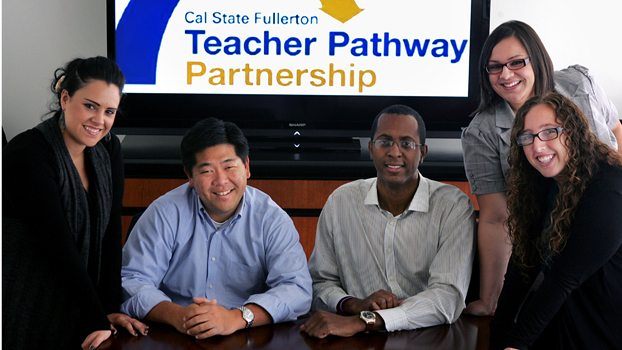 Caption: Faculty member Daniel S. Choi, second from left, leads the Teacher Pathway Partnership with the help of, from left, Amanda Davidson, Amir Law, Kim Hamon and Karina Martinez. Photo by Karen Tapia. Download Photo
Caption: Faculty member Daniel S. Choi, second from left, leads the Teacher Pathway Partnership with the help of, from left, Amanda Davidson, Amir Law, Kim Hamon and Karina Martinez. Photo by Karen Tapia. Download Photo
Teacher Pathway Partnership
State Grant Helps At-Risk Youth Pursue Teaching Careers
Graduate student Amanda Davidson spends 15 to 20 hours a week as a mentor and role model for 29 students attending Santiago Canyon College.
Her goal? To help guide them in their pursuit of a four-year college degree and teaching credential to become teachers.
“I’m passionate about working with students and using my experiences and the knowledge I have to help them develop as individuals and future teachers,” said Davidson, a first-year student pursuing a master's degree in education. “Many of these students have faced difficult challenges in obtaining their education and I know how the struggle feels. Watching these students grow as individuals is rewarding to me.”
Davidson’s work with community college students is made possible through a nearly $500,000 state grant for the Teacher Pathway Partnership program, led by Daniel S. Choi, assistant professor of educational leadership.
The grant award, from the California Employment Development Department in conjunction with the Governor’s Office of Gang and Youth Violence Policy, focuses on expanding higher education opportunities for at-risk youth.
Launched this fall, the two-year program involves a partnership between the university’s College of Education; Santa Ana, Santiago Canyon and Fullerton colleges; local California Workforce Investment Boards; and area after-school programs.
“This partnership will help these students with post-secondary education and teacher preparation training, providing them with an attainable pathway to teaching,” Choi said. “What we’re offering is a long-term and comprehensive approach that will lead not to just a job — but a teaching career and self-sufficiency.”
Pathway to Success
There are 75 students at the three Orange County community colleges participating in the program, which integrates coordinated services and paid employment at local after-school programs to provide them with income, job training and teaching experience.
Students also receive support for child care, transportation and book costs as they work toward completion of their college education, added Choi, a former middle school teacher who has worked with disadvantaged youth.
Participants also are supported in their pursuit of a bachelor’s degree and teaching credential through Cal State Fullerton. They are encouraged to seek K-12 teaching jobs in high-need school districts, including in their own communities, Choi said.
The teacher pathway program integrates science, technology, engineering and mathematics experiences throughout their college coursework and encourages students to seek careers as STEM (science, technology, engineering and mathematics) teachers, especially in elementary and secondary schools in areas of high need. This focus also ties in with the university’s heightened emphasis on increasing student interest in the STEM disciplines.
Team Approach
In efforts to provide a comprehensive academic and career-focused program, each community college has a student support services team of graduate students and a project specialist who collaborate with senior-level coordinators, faculty members and counselors at each community college. The postgraduate students attend classes with program participants; hold group meetings to cover topics such as time management, goal setting and study skills; and share their own college experiences — both setbacks and successes.
“The primary purpose of the team is to support student participants and assist them in addressing the academic, economic and other barriers they face,” Choi said. “We’re dealing with students who experience at-risk factors such as poverty, low academic performance, vulnerability to gang activity and barriers to higher education.”
“I help guide and coach the students with their classes and provide them with many resources to help them attain their college goals. My role as a resource and a role model to the students is what I find the most important part of my job,” Davidson said.
Davidson, who is pursing a career in higher education student affairs, added that the opportunity to be involved in the grant project is helping her achieve her own goals of one day working with college students.
“I feel that this project is so beneficial to these students and I want to contribute to their success,” she said. “I hope to instill my passion for education to the students I am mentoring. Through this program, they will grow to be more disciplined, dedicated and determined about their education — and about becoming teachers.”
Nov. 3, 2011; updated Nov. 15, 2011
